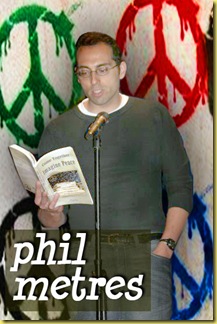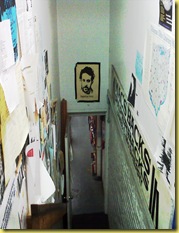
The first time I ever read my work in public was at Mac’s Backs paperbacks sometime back in the ‘80’s in the days when Mark Hopkins was booking the readings and advertising them with woodcut print featured fliers and cars ran on coal. Mac’s has been ubiquitous with the poetry community in Cleveland for as long as I can remember. Suzanne there has always been a champion of the local publisher and writer. I can’t say for sure – but I would venture the supposition that the Wednesday reading there is the longest running series in town.

This past Wednesday I made the trek to their Cleveland Heights 1820 Coventry Road location to catch a reading by a couple of the area’s long time established poets. I don’t make many of these readings anymore, certainly way less than when I used to live across the street from the shop) but I try to check in a couple times a year. The readers were Robert McDonough and Jerry Roscoe.
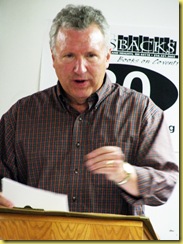
The reading was scheduled to start at 7pm but true to PST (Poetry Standard Time) it really got rolling closer to 7:30. Just two features no open mic so the whole shebang was done by twenty after eight. Before the reading commenced Suzanne made some short announcements making everyone aware of the late start. I chatted with Sammy Greenspan about Mary Oliver and literacy. I told her about a writer of several teachers professional books who was denied permission of using an Oliver piece in a text book because Oliver “Didn’t want her work interpreted.” I wondered if that also meant she didn’t want her work read – because in my opinion all reading is an interpretation.
Jerry Roscoe was the first reader. He is the author of several collections and the recipient of two Individual Artist Fellowships from the Ohio Arts Council. He opened his set with a piece about his son t
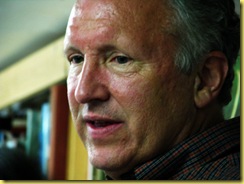
hen proceeded in quick succession to roll one piece into another with little pause and no commentary separating the poems. His subject matter ranged from Catholic grammar school reminiscences the big bang theory and sex. His reading style fell into an academic sing song and I found myself struggling to piece a narrative to his work. Occasionally I was pleased to catch a nice turn of a phrase but his habit of ending a piece on an upswing, as if there were more coming left me feeling like the works were not finished. I did however buy one of Roscoe’s chapbooks so that I could get a better idea of what his work was like. I don’t know if this is the most effective marketing plan.
Here’s an excerpt of Roscoe’s poem AGAINST REVELATION from his chapbook, s-e-x published by Pudding House Publications:
What do we care if the moon
Provides no light of its own?
It is cunning enough at least
To get in position to cheat
Off the brightest student in the class.
The basement of Mac’s Backs is where the readings take place – thankfully the temperature outside was not too high – but nonetheless the room was humid and the crowd of twenty or so folks occupying the wooden folding chairs approached the limit of comfortable capacity. A woman up front languidly fanned herself with the front section of the New York Times as Robert McDonough replaced Roscoe at the podium.
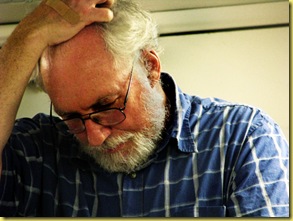
McDonough opened his set with a piece about his daughter – both men began with poems about their children. This got my mind wandering about how we as poets pick our subjects or perhaps more Zen – how our subjects pick us. Most of Robert’s material came from his collection of Greatest Hits, a chapbook also coincidentally, published by the Pudding House Press. McDonough’s reading seemed a bit more relaxed and conversational than Roscoe’s. This I believe can be attributed to home field advantage. McDonough has been leading a monthly writing workshop in the basement space for around seventy five years or so. He introduced his pieces with applicable anecdotes that didn’t explain the poem to follow as much as they set the table for their serving.
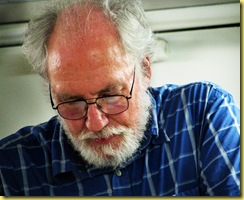
McDonough’s work is personal, observational without becoming confessional and spiced here and there with humor. His piece on writer’s block titled, Dry Humping the Muse from Greatest Hits, Pudding House Publications:
It’s a hard grind. She doesn’t even say
she has a headache, she just lies
there, polite enough, face set
in a little smile. And she lets you try:
you can touch her in all the secret places
that worked once but don’t now,
you can try new things you’ve never
dreamed of, get a little rough with her.
She doesn’t mind as long as some things are clear:
It’s not her fault, she’d be
perfectly willing if you could…
and she won’t fake it. Sorry,
she says, straightening her clothes,
she doesn’t want to hurt your feelings
but if you’ve forgotten how,
she can always find someone else.
McDonough finished his set ruminating on the phrase “close enough.” Poetry he decided should be closer than enough.
Then boom, just in time for my parking meter to expire the reading was over. I grabbed my new chapbooks promising myself that Mac’s backs and I need to cross paths more often. Mac’s Backs Wednesday readings – get ya some.

 A great article today in the Chicago Sun-Times about the fifth annual Printer's Ball. It starts like this . . .
A great article today in the Chicago Sun-Times about the fifth annual Printer's Ball. It starts like this . . .


